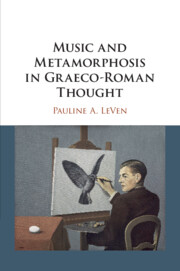Book contents
- Music and Metamorphosis in Graeco-Roman Thought
- Music and Metamorphosis in Graeco-Roman Thought
- Copyright page
- Dedication
- Contents
- Acknowledgments
- Abbreviations
- Introduction
- Chapter 1 Forest: On Surrounds
- Chapter 2 Ringdove: On the Uncanny Power of Performance
- Chapter 3 Cicadas: On the Voice
- Chapter 4 Echo: On Listening
- Chapter 5 Reeds: On Musical Objects
- Chapter 6 Nightingale: On Expression
- Chapter 7 Beetle: On Rhythm
- References
- Citations Index
- Subject Index
Chapter 6 - Nightingale: On Expression
Published online by Cambridge University Press: 25 November 2020
- Music and Metamorphosis in Graeco-Roman Thought
- Music and Metamorphosis in Graeco-Roman Thought
- Copyright page
- Dedication
- Contents
- Acknowledgments
- Abbreviations
- Introduction
- Chapter 1 Forest: On Surrounds
- Chapter 2 Ringdove: On the Uncanny Power of Performance
- Chapter 3 Cicadas: On the Voice
- Chapter 4 Echo: On Listening
- Chapter 5 Reeds: On Musical Objects
- Chapter 6 Nightingale: On Expression
- Chapter 7 Beetle: On Rhythm
- References
- Citations Index
- Subject Index
Summary
The version quoted above, preserved by Apollodorus, is the Attic one, that adopted in most narratives. It was already known to Hesiod and we find allusions to it in one of Sappho’s fragments, which refers to “Chelidon daughter of Pandion.” It is also the tale that Attic tragedy relies on, most spectacularly Sophocles in his Tereus, and is exploited by Ovid and Achilles Tatius in narratives that this chapter will explore in detail. The second, Theban version is alluded to in the Odyssey and was also known by the fifth-century BCE mythographer Pherecydes. In that version, the queen Aedon, daughter of Pandareus, kills her own son Itylus by mistake, thinking she is killing her sister Niobe’s oldest son. Aedon is ultimately transformed into a nightingale who mourns her young. The third version is idiosyncratic and told only by the Imperial Greek author Antoninus Liberalis (Met. 11). Its complexity makes it difficult to provide a summary, but the tale unfolds along the following lines: Pandareus from Ephesus gives his daughter Aedon (a weaver) in marriage to Polytechnus from Colophon (a carpenter). The couple are happily married but taunt Zeus and Hera by asserting that their conjugal bliss is greater than that of the Olympians. Hera sends Strife among them, who makes them compete in a crafts competition. Polytechnus loses to his wife, and to avenge himself, rapes Aedon’s sister Chelidon and (after shaving her head and dressing her in slave clothes) gives her as a servant to Aedon. Aedon overhears her sister’s lament and recognizes her. The two avenge themselves by killing Polytechnus’ son Itys and serving him to his father to eat. After a few more narrative turns (with punishment and changes of heart), all characters (including, surprisingly, all of Aedon’s family) are transformed into a variety of birds – land birds for Aedon, turned into a nightingale; Chelidon, a swallow; Polytechnus, a woodpecker, and Aedon’s brother, a hoopoe; and seabirds for Aedon’s father Pandareus, turned into an eagle, and her mother, turned into a kingfisher.
- Type
- Chapter
- Information
- Music and Metamorphosis in Graeco-Roman Thought , pp. 168 - 205Publisher: Cambridge University PressPrint publication year: 2020



